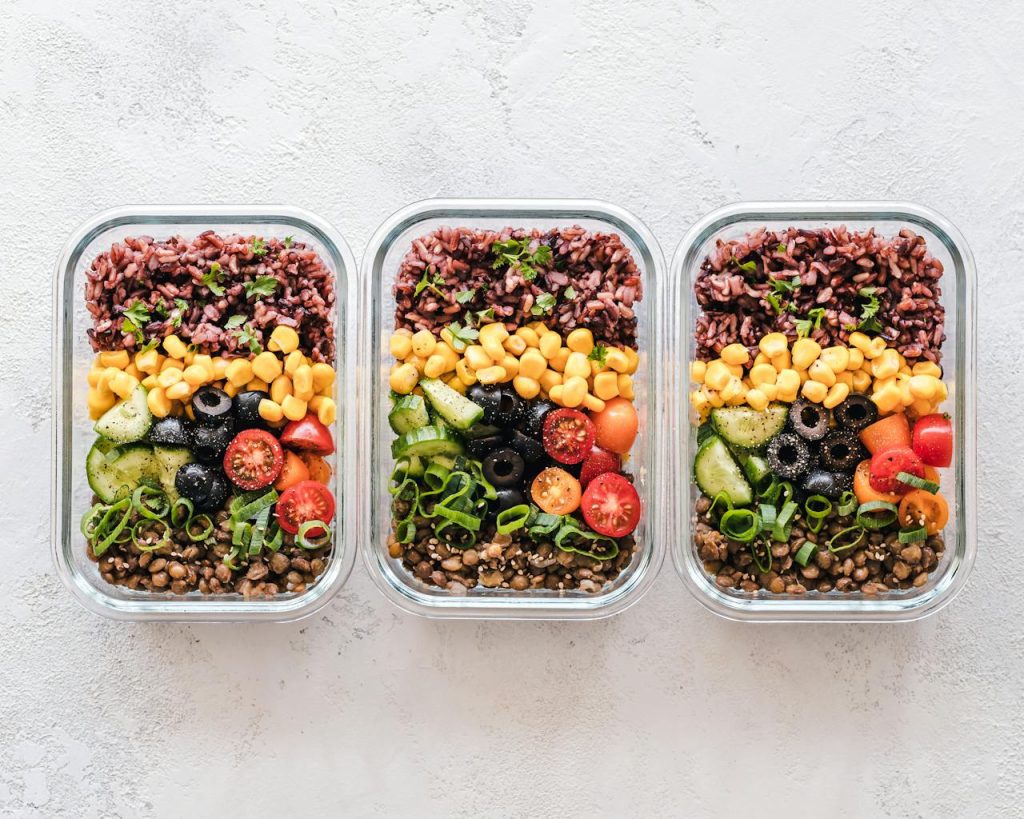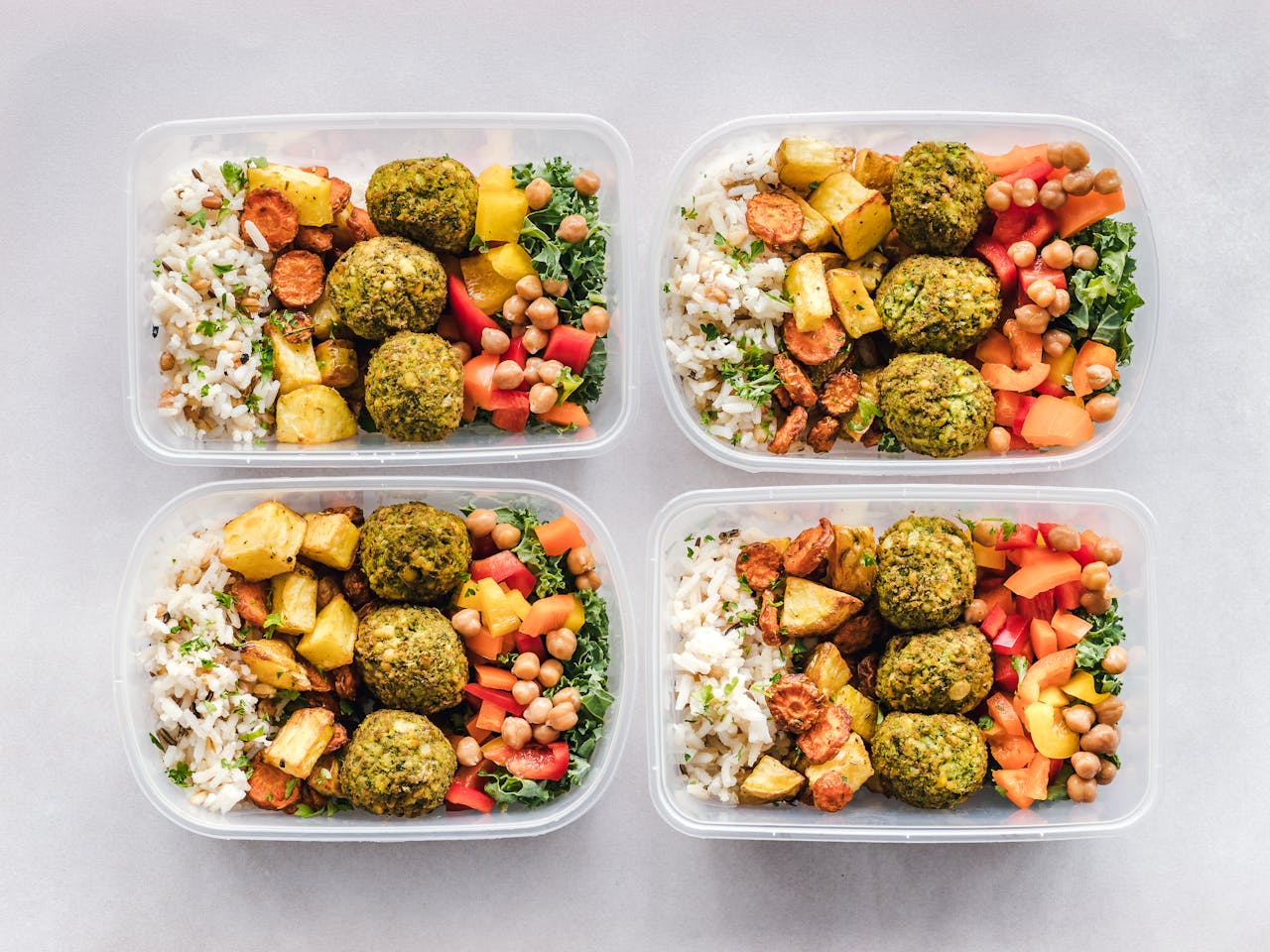Last Updated on November 6, 2024
What is Meal Prepping?
Preparing your meals or commonly known as meal prep is the practice of planning and preparing meals in advance. It’s a great way to save time, reduce stress, and ensure you eat healthy, balanced meals. With our busy lives, meal prepping has become an essential part of maintaining a balanced diet without spending hours in the kitchen every day.
Why Choose a Specific Day?
Selecting a dedicated day each week for meal prep can significantly elevate your efficiency and make the process far more manageable. By setting aside time on a specific day, you create a routine that integrates meal prep into your weekly schedule, turning it into a positive habit rather than a tedious task. Here’s how it can benefit you:
Stress Reduction and Peace of Mind
Life can get busy, and meal prepping removes the stress of having to think about meals each day. By dedicating one day to preparing food for the week, you can focus on other priorities, knowing that your meals are already taken care of. This not only saves time but also gives you peace of mind, knowing you have nourishing food ready for when you need it.
Improved Consistency and Planning
When you have a specific day set aside, it becomes much easier to plan your meals and grocery shopping in advance. You can spend a few minutes at the start of each week planning meals, listing ingredients, and organizing your shopping list. This kind of routine minimizes last-minute decisions, reduces stress, and ensures you always have healthy meals ready to go.
Enhanced Motivation and Accountability
A scheduled day acts as a built-in reminder, making you more likely to stick to your meal-prepping routine. Just like a workout schedule or a weekly meeting, having a specific day for meal prep gives you a sense of commitment. When you know that “meal prep Sunday” or “meal prep Wednesday” is approaching, it creates a gentle reminder to prioritize your health and nutrition.
Habit-Building and Reduced Decision Fatigue
Choosing a specific day each week to prep meals helps you form a habit that becomes second nature over time. This routine reduces decision fatigue by eliminating the daily question of “what should I eat?” Instead of constantly choosing and preparing meals each day, you free up mental space and energy by making those decisions once a week. Meal prep becomes a natural part of your week, something you do without having to think about it each time.
Efficient Use of Time and Resources
Batch cooking and prepping on a set day allow you to maximize your time in the kitchen. By preparing meals in bulk, you cut down on repeated cooking tasks, like chopping vegetables or cleaning dishes, which can be time-consuming when done separately each day. This streamlined approach not only saves time but also helps reduce food waste and enables you to make full use of the ingredients you purchase.
Financial Savings
Meal prepping can also have a positive impact on your budget. When you prepare your meals in advance, you’re less likely to order takeout or make impulsive grocery purchases during the week. Knowing what meals you have planned helps you stick to your grocery list, which can prevent overspending and save money over time.
Supporting Health Goals
Having a set day for meal prep gives you the opportunity to align your meals with your health and fitness goals. You’re more in control of what goes into your food, allowing you to portion meals accurately, incorporate the nutrients you need, and avoid unnecessary additives found in processed foods. For those looking to manage weight, build muscle, or simply eat healthier, regular meal prep can be a powerful tool for staying on track.
The Best Day to Meal Prep: Sunday
Why Sunday?
Most people find Sunday to be the best day for meal prepping. Here’s why:
- Weekend Vibes: Sundays are typically more relaxed. You have the time to focus on prepping without the rush of weekdays.
- Fresh Start: Preparing your meals on Sunday sets you up for a successful week. You start Monday with a plan and ready-to-go meals.
- Family Time: It can be a fun activity to do with family or roommates, turning meal prep into a bonding session.
Supporting Evidence
Sunday is the most popular day for meal prepping because it allows for a fresh start to the week. People have more time to shop for groceries, plan meals, and cook without the distractions of work and weekday commitments .
Alternatives to Sunday
While Sunday is popular, it might not be the best day for everyone. Here are some alternatives:
Saturday
Pros:
- Less Rush: You have two days (Saturday and Sunday) to complete your prep if needed.
- Weekend Freedom: Completing meal prep on Saturday frees up your Sunday for relaxation or other activities.
Cons:
- Busy Saturdays: Saturdays can be busy with social events, errands, or relaxation, leaving less time for meal prep.
Mid-Week (Wednesday or Thursday)
Pros:
- Mid-Week Replenishment: Prepping mid-week can be great for those who like fresher meals. It allows you to split your meal prep into two smaller sessions.
- Less Crowded Stores: Grocery stores are usually less crowded mid-week, making shopping faster and less stressful.
Cons:
- Work Interference: Prepping during the week can be challenging with work and other weekday commitments.
Monday
Pros:
- Fresh Groceries: Starting the week with fresh groceries can be motivating.
- Extended Weekend: You get to extend your weekend relaxation into Sunday.
Cons:
- Weekday Rush: Mondays can be hectic, and adding meal prep to the mix might be overwhelming.
Friday
Pros:
- Weekend Free: Prepping on Friday leaves your entire weekend free.
- Fresh Produce: You can use the freshest ingredients for your meals.
Cons:
- Friday Fatigue: After a long workweek, the last thing you might want to do is spend hours in the kitchen.

Tips for Successful Meal Prepping
Regardless of the day you choose, here are some tips to make your meal prepping efficient and effective:
Plan Your Meals
Use a Weekly Planner: Write down your meals for the week. It helps in creating a grocery list and ensures you have all the ingredients you need.
Grocery Shopping
Make a List: A detailed grocery list saves time and reduces the chances of forgetting ingredients.
Shop Smart: Buy in bulk for non-perishable items and fresh produce that will last through the week.
Efficient Cooking
Batch Cooking: Cook large batches of staples like grains, proteins, and veggies that can be mixed and matched.
Use Kitchen Gadgets: Slow cookers, instant pots, and air fryers can save time and make meal prep easier.
Prep in Steps: Chop vegetables and marinate proteins first, then cook everything in stages.
Storage
Use Proper Containers: Invest in good-quality, airtight containers to keep your meals fresh. Glass containers are a great option as they are durable and can be used for reheating.
Label Your Meals: Labeling helps you remember what’s in each container and the date it was prepared.
Variety is Key
Mix It Up: Avoid meal prep burnout by varying your meals. Try different cuisines and recipes each week.
Healthy Snacks: Prep healthy snacks like cut fruits, veggies, and nuts to keep you fueled between meals.
Benefits of Meal Prepping
Time-Saving
Meal prepping saves a significant amount of time during the week. Instead of cooking every day, you only need to reheat your pre-prepared meals.
Cost-Effective
Planning meals and buying groceries in bulk can save money. It reduces the temptation of ordering takeout or dining out.
Healthier Choices
Having pre-prepared meals means you are less likely to opt for unhealthy options. You control the ingredients and portions, ensuring a balanced diet.
Stress Reduction
Knowing what you’re going to eat each day removes the daily stress of deciding and preparing meals. It also helps in sticking to your dietary goals.

Conclusion
The best day to meal prep ultimately depends on your personal schedule and preferences. Sunday is a popular choice because it offers a fresh start to the week, but alternatives like Saturday, mid-week days, Monday, or Friday can also work well. The key is to find a routine that fits into your lifestyle and makes meal prepping a sustainable habit.
By planning ahead, shopping smartly, and using efficient cooking methods, you can make meal prepping a seamless part of your weekly routine. Not only will it save you time and money, but it will also contribute to a healthier and less stressful lifestyle. So, pick your day, plan your meals, and enjoy the benefits of meal prepping!
References
- MyFitnessPal – “The Best Day for Meal Prepping”
- Healthline – “How to Meal Prep: A Beginner’s Guide”
With these tips and insights, you’re well on your way to mastering meal prepping. Happy prepping!







